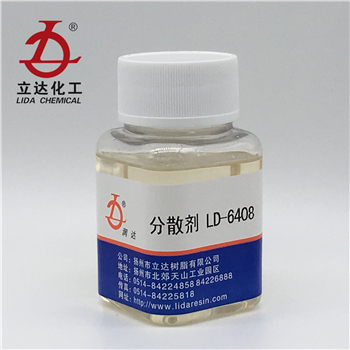Hyperdispersant of Waterborne Inorganic Pigments and Fillers LD-6408

First, technical dexes
Appearance: colorless to light yellow liquid
PH: 6-8
Solid portion content (wt%): 40±2
Solvent: water
Second, characters and usages
The waterborne hyperdispersant LD-6408 with comb type molecular structure is composed by a main chain,
the polyacrylic acid and a highly optimized special polymerization side chain. It not only can strongly adsorb on the surface
of inorganic fillers to produce electrostatic repulsive-force but also form effective space barrier layer on the particle surface to
make inorganic pigments and fillers equipped with excellent dispersity and long-time stability in waterborne medium.
It can resist high temperature as well as the general acid and alkali hydrolysis conditions. It can be compatible with
waterborne resin and resin latex. When forming film, it has little influence on coatings’ matrix resin performance.
It is suitable for different inorganic pigments, synthetic fillings and water borne dispersion of ore power,
especially for the water dispersion of inorganic nano pigments and functional fillers like transparent iron oxide,
nano titanium white, nano calcium carbonate and nano-zinc oxide. It is the ideal choice of mill base and waterborne coatings
which are of high concentration, high dispersion, high stability and high compatibility.
Third, instructions
The dispersant is soluble in water and has good tolerance to organic solvents such as alcohol and alcohol ether. The addition amount is 0.5% - 3% of that of common pigments and fillers. The specific dosage should be determined by experiment.
Forth, toxicity and storage deadline
The product belongs to nontoxic chemicals, so it is permitted to be used in coatings which directly touch food.
It should avoid being under the blazing sun for quite a long time or being frozen.
The storage period is 3 years since the date of production.
上一篇 下一篇